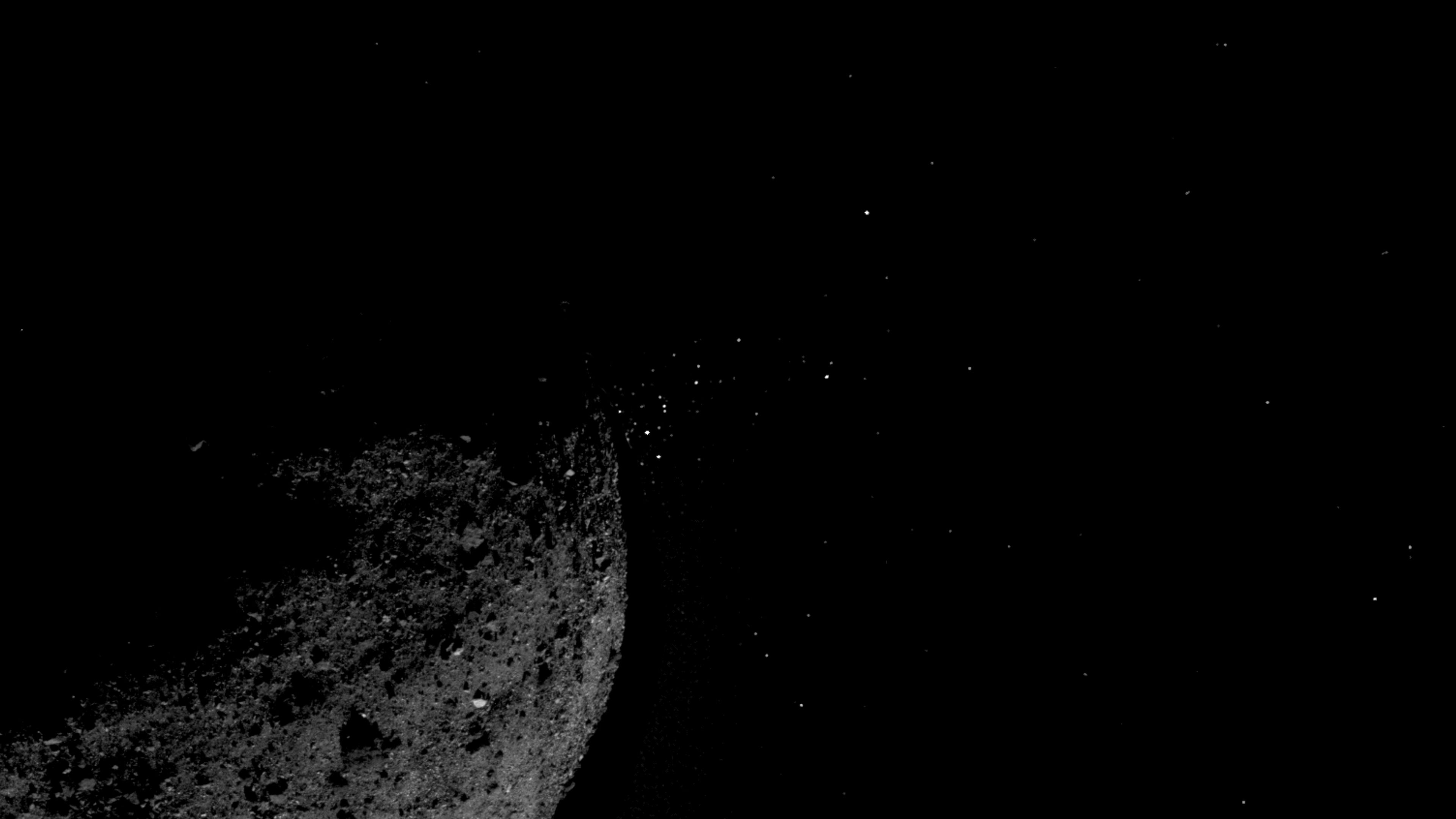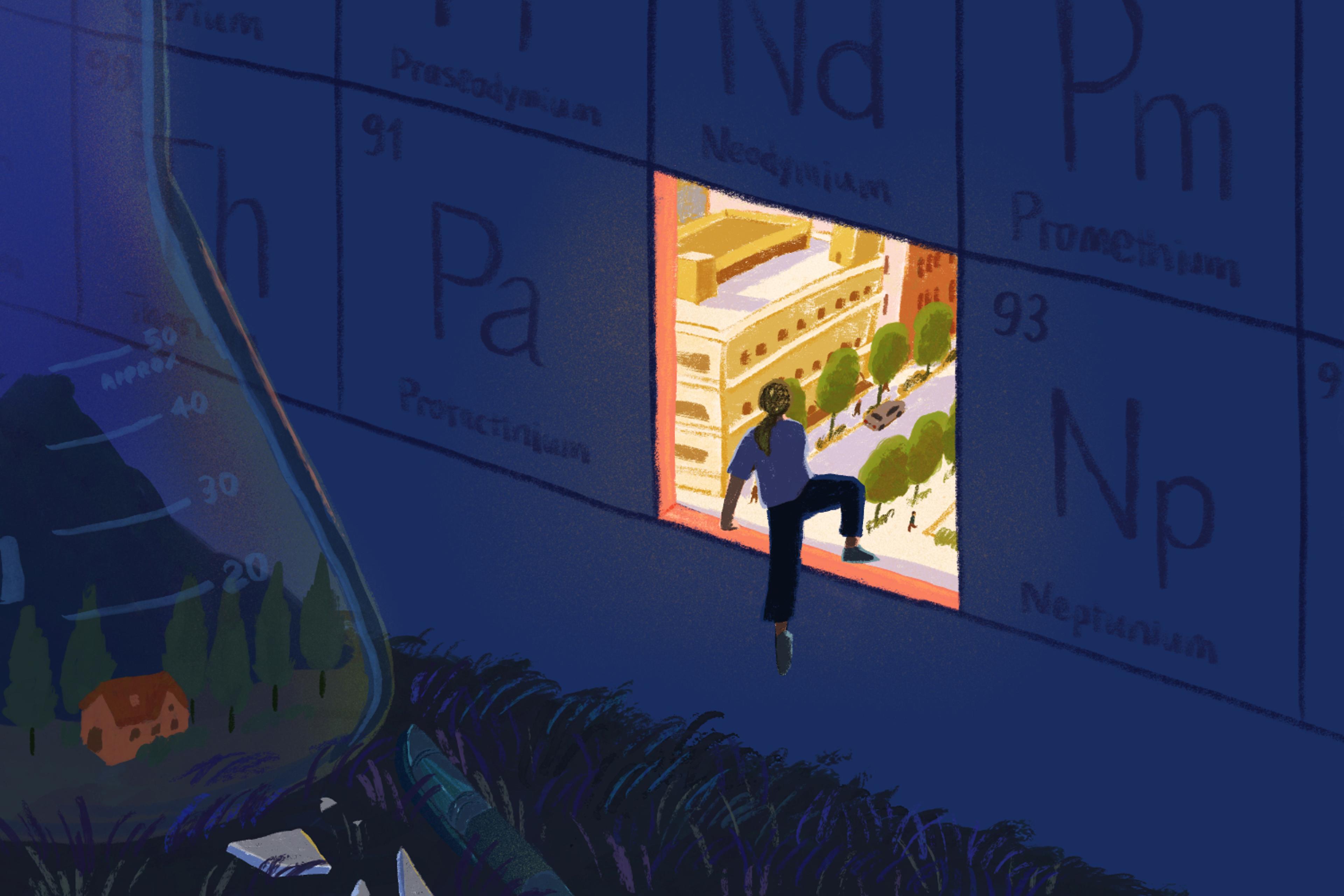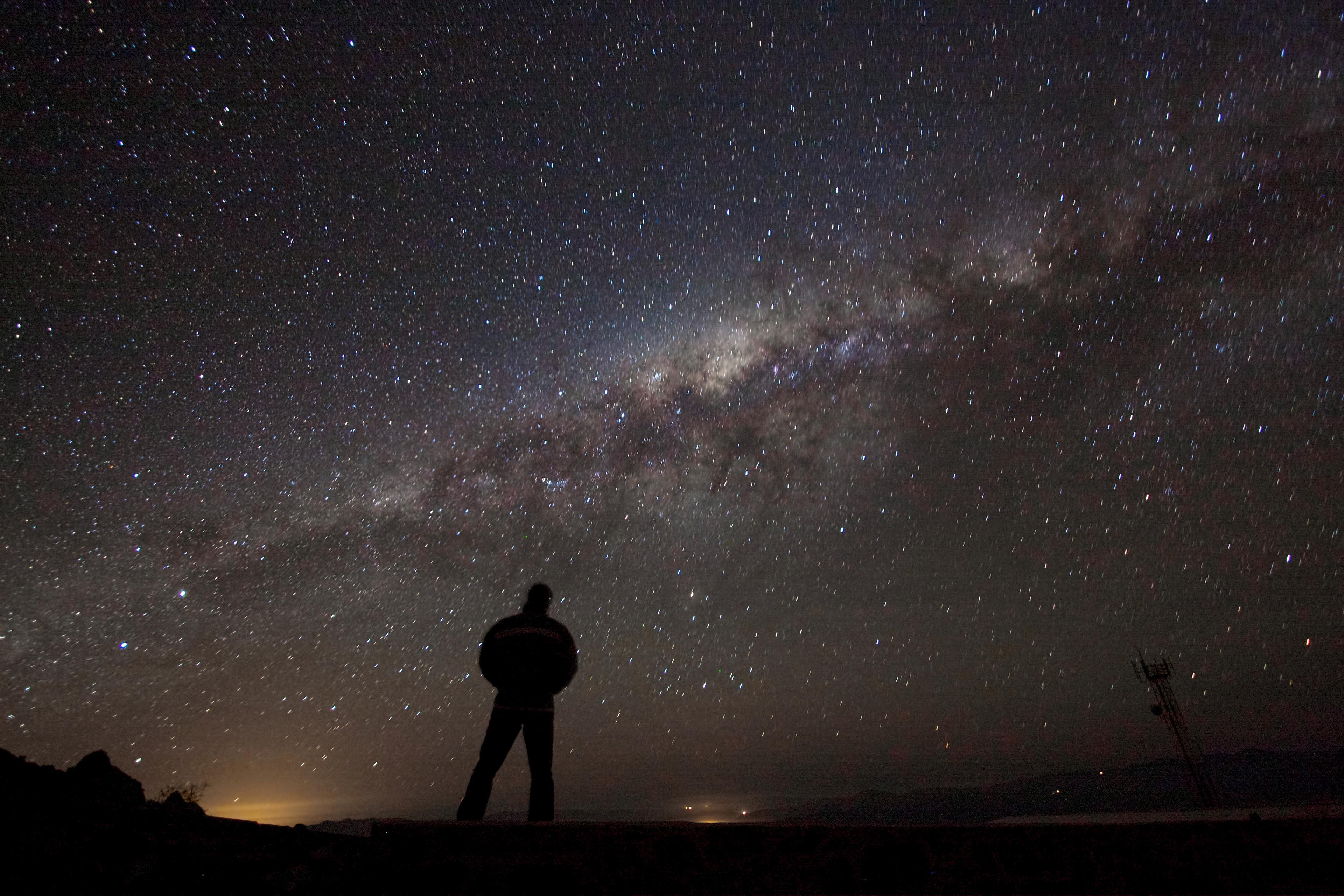In the vast emptiness of space, asteroid Bennu, slightly bigger than the Empire State Building, has orbited the Sun for billions of years without regard for our shifting seas, roaring volcanoes, glistening algae, flying dinosaurs or meddling humans.
Bennu is also an example of what scientists call – and, yes, this is a scientific name – a rubble-pile asteroid. That means it looks like one cohesive, solid body, but is just a lot of rocks loosely glued together by gravity. Like a kids’ ball pit, Bennu’s surface isn’t rigid enough to stand on. If you were an astronaut and tried to take ‘one small step’ there, your foot would sink.
When I first learned about this asteroid in the spring of 2018, while researching it as a writer for NASA’s Solar System Exploration website, I thought: ‘Oh, I feel just like Bennu.’
For one thing, sometime between 700 million to 2 billion years ago, Bennu broke off from a bigger asteroid and then drifted far from home. Once a resident of the Main Asteroid Belt between Mars and Jupiter, over time, thanks to the gravity of planets and light from the Sun pushing and pulling on it, Bennu has wandered closer to Earth. I, too, moved around a lot. I grew up near Philadelphia, then moved to New Jersey, New York, and then Atlanta. In 2014, when I got a job offer in Pasadena, California, I felt the pull of sunny days, glamour and entertainment that the LA area seemed to offer, even though I hardly knew anyone there.
After the excitement of the move wore off, I started to feel like a pile of fragments of a world that could have existed, pretending to have a solid foundation.
During my early 30s in California, good friends cruised in and out of my life, stopping briefly to chat before speeding away down the 110 freeway into new jobs, relationships, marriages, child-rearing or new homes in other parts of the country. Romantic relationships of my own, largely begun on apps, came and went even faster – in a few best cases, they quickly ended in an agreement to be friends. I could park myself at work into late evenings, but my projects didn’t give me the creative outlet I craved. The freelance writing I had kicked into high gear on nights and weekends in 2017 had left me burned out. Every time I jogged by the Caltech dorm that had been my close-knit community during a summer internship years earlier, I wondered if I could ever feel so complete again.
I felt like I was doomed to wander alone in the emptiness of space, small and insignificant
Meanwhile, I learned from planetary scientists that Bennu is a relic of a time in our solar system’s history when small clumps collided to form bigger and bigger objects, sometimes enormous enough to form planets like Mercury, Venus, Earth and Mars. But Bennu and the other asteroids never came close to amassing the material they would have needed to join the exclusive planet club. They are the almost-planets.
By 2018, I felt like an almost-adult, as though my development also had been arrested. Married friends told me how lucky I was to go on a variety of dates and to have so much free time – after all, I had no obligations to a spouse or offspring. Empowerment! Liberation! Instead, I felt like I was doomed to wander alone in the emptiness of space, small and insignificant. And, while I accumulated the fog of sadness, many of my friends seemed to be achieving big life goals, gleefully advertising ‘some personal news’ on social media often enough to make me want to leave the platforms entirely (though I still haven’t).
Of course, I always put my ideal self forward on social media, too. No one would have known from my idyllic photos of Catalina Island or Santa Monica that I felt like a collection of shattered pieces loosely held together, floating all alone in space, while appearing to be doing just fine from a distance.
Asteroid Bennu doesn’t cry (unless you count spitting out rocks into space). But I did – a lot.
What’s a lonely small asteroid – I mean, a 30-something who feels stuck – to do?
At the time, I had a few sessions with a therapist who suggested that I look into mindfulness meditation, in which you focus on the present moment. I’m someone with a constant stream of thoughts that isn’t easily quieted, even through a guided meditation practice. But I did try to find activities that would re-focus my attention in a positive way.
Even though I felt like spending my evenings eating Pop-Tarts and watching The Marvelous Mrs. Maisel, I forced myself to go to salsa classes near my apartment instead. I also volunteered more often at an organisation called 826LA, where I helped young kids report, write and edit short articles for the 826 newspaper. It felt good to shift my mental focus away from myself and fully engage with others in structured activities.
Mindfulness, ‘the idea of starting to train your brain and attention to focus non-judgmentally’, is also helpful for managing a stream of negative thoughts and feelings, says Sabrina Stutz, a clinical psychologist in Orange County, California, whom I contacted for this article.
Getting into the present moment can be as simple as focusing your senses on what is happening around you right now and mentally taking note of the sights, sounds, smells and other elements of your current space. Some may also benefit from exercise, such as running, biking or swimming to engage the body in immersive, present-moment activities and leave unwanted thoughts behind. For me, salsa dancing and volunteering served this purpose.
The reality is that a lot of us operate in an area as grey as asteroid Bennu
Therapists like Stutz also help people identify the kinds of thought patterns that may be distressing or holding them back. Now that I know more therapeutic vocabulary, I can see that I have struggled with what psychologists call ‘black-and-white thinking’. For example, I would sometimes arrive at a first date thinking: ‘OK, this is either going to be my forever person or I’m never going to see them again,’ and ended up with mixed feelings. I also believed that, because I was over 30, it was ‘too late’ for me to make more big changes, such as moving to yet another city.
The reality is that a lot of us operate in an area as grey as asteroid Bennu. For black-and-white thinking, Stutz advises learning ‘to recognise it, to be able to clock when it’s happening’. Then, look carefully at the evidence. I’m not sure if I deliberately did this kind of work, but in trying to dig myself out of a crater of hopelessness, I tried to take the attitude that first dates didn’t matter that much, and that age is just a number. But also, with the help of my therapist, I gave myself permission to take a break from endlessly swiping for new dates on apps, since dating had triggered my deepest feelings of distress.
Stutz says she also helps patients identify their core values – the top things that are really important to them. When they’re feeling broken, she encourages them to think about: ‘What are the things that, at the end of the day – regardless of what they achieve, or don’t achieve, who they’re friends with, or who they’re not friends with – help them feel whole?’
Then, with a list of core values in hand, people can start aligning their thoughts and actions with them. If finding community is most important, focus energy there. If creative pursuits are most important, look for ways to further those or make more time for them. Again, I didn’t have this vocabulary in 2018, when I was putting myself back together, but Stutz’s description helps makes sense of the way I tried to shift my mindset in my emotional healing. For instance, I wanted to deepen friendships with others and grow as a science storyteller, and tried to do both with a new intention.
I learned about Bennu because of my science storytelling work, to contribute to a public-friendly website that others use as a reference. But Bennu also gave me a sort of metaphorical reference point as I gave myself the time, space, and compassion to put myself back together.
On a walk in Pasadena’s Hahamongna Watershed Park, when I told a friend how broken my personal life felt, he told me that life is full of contrasts. You can’t know what happiness feels like without sadness. You can’t know what a good relationship is unless you’ve had a bad one.
Earth is teeming with life, in contrast with what’s happening on asteroids like Bennu. Earth has an atmosphere and water and temperatures pleasant enough to support countless species. Bennu has no atmosphere to protect it, no rivers or lakes or oceans, no source of energy for life to thrive.
But scientists are interested in Bennu because they think it has essential ingredients for life as we know it, called organic compounds. These molecules, preserved for billions of years, could resemble the very materials that helped start life on Earth. There are also signs that water might once have flowed on Bennu when it was part of a bigger asteroid billions of years ago.
When I moved across the country to Washington, DC in December 2018, for what was originally a temporary new job assignment, I noticed many contrasts. Walking up 7th Street NW among tall buildings that lacked both familiarity and memories, it was refreshing to focus on the novelty of my surroundings. I also had friends in DC from lives I led prior to California, from college or from Atlanta, who had all coincidentally ended up there. Unlike Lake Avenue and Colorado Boulevard in Pasadena, the streets of DC did not feel littered with the rubble of my personal failures.
Do the things that make you feel complete. Don’t let other people’s lives set your timeline
In this new environment, I furthered my core values in new ways. I became interested in audio and video storytelling, and found ways to incorporate both into my DC job. I reconnected with friends from my pre-Pasadena past who happened to live in DC. For the first time in years, I felt whole and good and, if I didn’t have a serious relationship, that was OK. It was in that more relaxed and open mindset that I ended up meeting the wonderful man who is now my husband. Today, I know what stability feels like because I also know what instability feels like.
The me of January 2018 felt angry and offended whenever anyone said: ‘Everything will work out!’ or ‘You’re so young! You can do anything!’ So, if I could offer words of wisdom to my former self, I know neither cliché would be productive. Instead, I would say to her: ‘It’s OK to focus on yourself and do the things that make you feel complete. Don’t let other people’s lives set your timeline. Pursue your passions, and take all the time you need for you.’
Asteroid Bennu didn’t stay alone forever, either. In 2020, a spacecraft called OSIRIS-REx briefly descended on Bennu and scooped up material to take to Earth. I cheered for this achievement with a special vigour. That sample is expected to fall in the Utah desert in September 2023, so scientists can see what’s inside it.
Maybe, as researchers recently discovered with material from a different asteroid called Ryugu, there are chemicals present in Bennu that are essential for RNA, a key component of life.
Maybe asteroids like Bennu hit Earth billions of years ago, originating the delivery of such life-giving ingredients.
I still feel some kinship with Bennu, and maybe you do, too. After all, who hasn’t at some point felt like they were putting forward their best appearance, while secretly feeling like a pile of pebbles, gravel and dirt.
We’re all just rocks in space orbiting the Sun wondering where we’re going next.
Maybe, pieces of Bennu will help put together the story of all of us.








